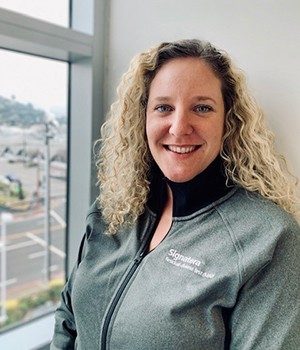By: Jamie Schwarzbach, MS, MBA

It all started with a memo.
While pursuing my graduate degree in chemistry, the University started a new program for those in the sciences, engineering, and medicine. The graduate business minor allows STEM students to learn more about business for future career moves. I was still unsure which path I would take, so I signed up for the minor without hesitation. I would’ve never thought that my first class would drive me to pursue an MBA and then a career in marketing.
What worked for me isn’t going to work for everybody, but here are some considerations for your next educational adventure.
Transitioning from lab to office
After I took my first business class, I felt I had only scratched the surface of what I could learn about business. The rest of the curriculum really helped me develop a well-balanced understanding of various disciplines within a business.
My path to marketing was non-linear and unintentional. Just being enrolled in business school opened up opportunities that I was suddenly qualified for, like an internship focused on market research that provided me with real-world skills for my future career path. You can read more about my advice to transition from lab to office here.
Now, I’m not suggesting everybody transition from working in a lab to sitting in front of a computer all day. A business degree or even just taking a few classes can provide you with skills that will help you in any career path you choose. For example, do you want to manage a research team? You’ll need some financial skills in order to keep your budget on track and need to know how to write and present compelling research proposals. You can apply this same logic to almost any career path. It’s also great if you want to distinguish yourself from other applicants.
The best part about part time studies: double degrees and continuing education
Going into school during the recession ended up being a great move for me. I wasn’t sure what I wanted to do since I loved chemistry, but didn’t always love research. I was one of those people who preferred talking about chemistry than actually doing it.
When you pursue double majors in science and business, often times you can receive funding and waivers for classes. I was able to fund my research by teaching as well as waive the majority of my class fees for business. Overall, it was a lot of work, but in order to stay mostly debt free, it was worth it.
Another option is to work during the day, and take classes outside of work hours through a part time program. Many companies provide continuing education stipends, which cover employee tuition or registration costs for night or weekend courses. Look into these benefits at your current job or when considering future opportunities. This way, you can lessen financial burden, while still being able to expand your job prospects.
Unexpected resources
I was pleasantly surprised to learn about the resources my business school had that ended up being really useful. In my short time with the College of Business, I was able to complete two contract projects, assist with a sales course, work at an entrepreneurship center, and travel to England to study abroad with my cohort.
Other important resources that my University offered were a technology transfer office, small business office, and entrepreneurship center (and club). Look for these free resources that can help reduce the barrier to start your own business.
My career continues to take shape, and who knows where I’ll be in another 5 years, but I know that my business degree helped guide me to a career that makes me excited to wake up each morning.
This article has been edited for length and clarity. The opinions expressed in this article are the author's own and do not necessarily reflect the view of their employer or the American Chemical Society.
Copyright 2022 American Chemical Society (All Rights Reserved)








